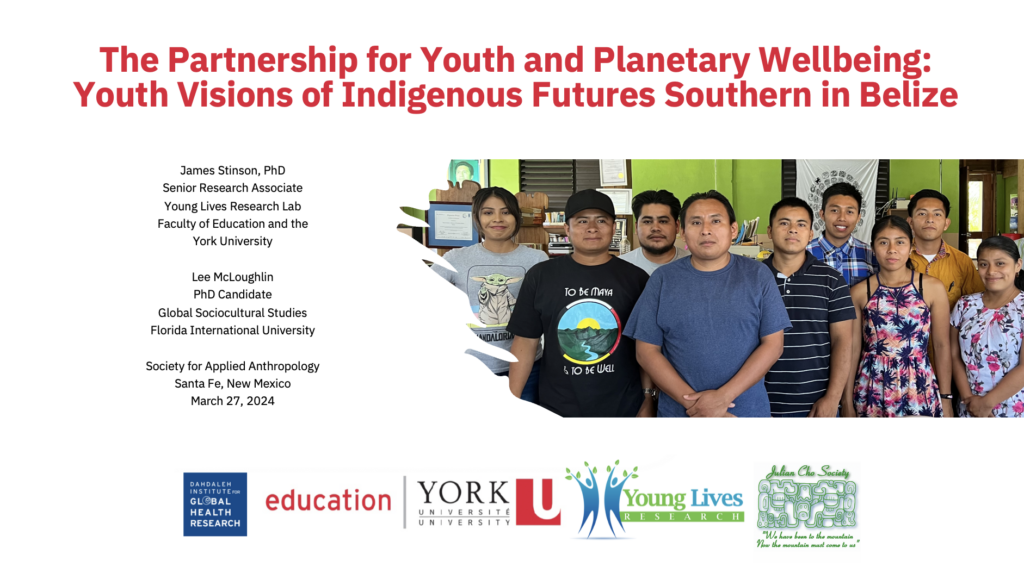Post
Published on May 13, 2024
Dahdaleh research fellow James Stinson and research assistant Lee Mcloughlin recently presented at the Society for Applied Anthropology annual conference in Santa Fe, New Mexico on a panel titled "Decolonizing Alliances for the Post-Carbon Transition." The panel explored how Indigenous/non-Indigenous alliances contribute to the cultivation of sustainable and just post-carbon ways of life, and reflected on the possibilities and complications associated with diverse approaches to alliance formation and on the roles that engaged anthropologists might play.
James and Lee presented results from the Partnership for Youth and Planetary Wellbeing project in Belize. Led by Professor Kate Tilleczek, the project is a collaboration between researchers from York University and the Julian Cho Society (JCS) in Belize. JCS is an Indigenous NGO based in southern Belize committed to supporting and promoting sustainable development and the rights of Indigenous Maya communities through research, education and advocacy. The project responds to calls for new decolonial partnerships that aim to harness, support, and foreground Indigenous and youth-centred research, education and action for planetary health.
Throughout 2023, James and Lee worked with staff from JCS to train and mobilize a team of 10 Maya youth as "young anthropologists" to conduct interviews in their communities on issues related to planetary health. They also collaborated Dahdaleh research fellow Mark Terry and the Planetary Health Film Lab to train youth in documentary film production. This partnership facilitated innovative youth-led research on the impacts of climate change, the importance of food sovereignty, traditional ecological knowledge, and the struggle to secure Indigenous land rights in Maya communities, that was mobilized for both global policymakers at the UN and local audiences in Belize. Perhaps more importantly, youth participants noted the benefits of the project on their own wellbeing through the training and skills they received, the social connections made with with other youth and community members, and the development of leadership skills and confidence building.

Themes | Planetary Health |
Status | Active |
Related Work | |
Updates |
N/A
|
People |
Kate Tilleczek, Faculty Fellow, Faculty of Education - Active
Mark Terry, Research Fellow, Documentary Film & Global Health - Alum James Stinson, Postdoctoral Fellow, Planetary Health & Education - Active Lee Mcloughlin, Research Assistant, SMART Conservation - Alum |
You may also be interested in...
Black History Month 2023: Black Resistance
A series of panels remembering achievements in the face of struggles. Black History Month is a distinct period for honouring history, negotiating current realities, and imagining potential futures for Black communities. In recent years, the Harriet ...Read more about this Post
Research recap – Modelling Health Impacts of Climate Change Workshop in Malawi (August 2022)
This was our first in-person and onsite meeting of all PIʼs, fellows, and graduate students since the onset of the global COVID pandemic. From August 15 until August 25, we engaged in stakeholder consultations, partnership ...Read more about this Post
Climate Change Research Month showcases York as community of changemakers
A month-long series of events hosted by York University Organized Research Units (ORU) and campus groups aim to generate awareness on climate change research and mobilize community action. March 1 marks the start of the second annual ...Read more about this Post
